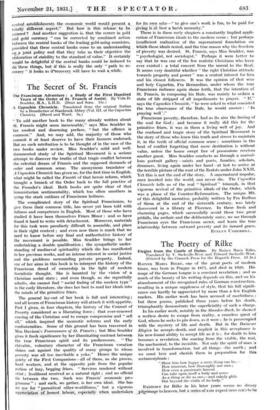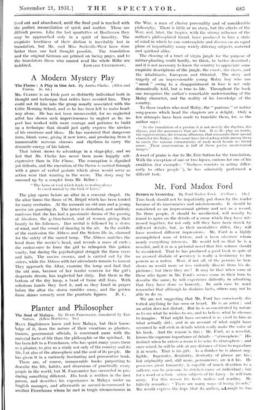The Poetry of Rtlke Elegies from the Castle of Duino.
By Rainer Maria Rake. Translated by V. Sackville-West and Edward Sackville-West. (Printed by the Cranach Press for the Hogarth Press. £3 3s.) RAINER MARIA RILKE, one of the great poets of modern times, was born in Prague in 1875, and died in 1928. His usage of the German tongue is a constant revelation ; and so
much of the beauty of his writing depends on this, and on his abandonment of the recognized rules of German construction, resulting in a unique suppleness of style, that his full sigriifi- cance can hardly be appreciated by more than a few English readers. His earlier work has been accused of morbidness ; but these poems, published three years before his death, triumphantly demonstrate the superficiality of such a charge.
In his earlier work, notably in the Siunden-Buch, he showed a restless desire to escape from reality, a ceaseless quest of God, whom he seeks to pin down, as it were ; he is preoccupied with the mystery of life and death. But in the Duineser Elegien he accepts death, and implicit in this acceptance is
his new-found ability to accept life as it is ; for death to hint becomes a revelation, the soaring from the visible, the real,
the mechanical, to the invisible. Not only the spirit of man :s involved in transformation, but all things—the earth ; and we must loVe and cherish them in preparation for this
metamorphosis :
" Show him how happy a mere thing can be,— How innocent, how thoroughly our own ; How even a passionate lament Can take upon itself a body and serve As a thing or die as one,—and calmly glide Out beyond the violin of its body."
lived out and abandoned, until the final goal is reached with the perfect .reconciliation of spirit and matter. These are difficult poems. Like the last quartettes of Beethoven they may be approached only in a spirit of humility. The exquisite loveliness of their diction is inevitably lost in translation, but Mr. and Miss Sacks-itle-West have done better than one had thought possible. The translation and the original German are printed on facing pages, and to the translators those who cannot read the whole Rilke are

































































 Previous page
Previous page